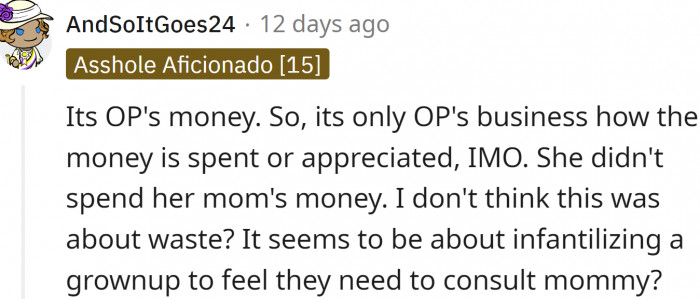Redditor Buys New Shoes Because Her Dog Chewed The Laces On Old Shoes, Gets In Trouble With Her Mom
Dogs chew on things, especially when they are young and their teeth are growing. But even adult dogs chew on things.
Dogs don’t have hands, and their way of discovering the world is through chewing.
However, there are ways to get them to stop. All you need is some patience and training.
Until you reach a point where you can be sure your favorite things won’t be on the day’s menu, you have to accept that you will suffer a loss from time to time. This story involves a pair of shoes that had their laces chewed by a dog.
OP’s dog chewed through the laces on her shoes. The laces have a design that she can't find when looking for replacement shoelaces, so she decided to get a new set of relatively affordable shoes.
They don't have laces, so the dog can't chew through them. OP thought it was a sound choice, especially because printed shoelaces would probably cost as much as the new pair.
But her mom didn’t think it was a good idea. She came into her room:
“My mum (F51), upon noticing that I'd thrown away the set of shoes with the chewed laces, retrieved them from the bin, threw them down in front of me (as in threw them down HARD, not just dropped them), and began shouting at me that 'I have more money than sense at the moment' and 'I don't want to help myself.' I admit to raising my voice at her while I was being shouted at.”
Now OP asks: “AITA for buying new shoes instead of new laces?”
OP asks:

OP’s dog chewed through the laces on her shoes

The laces have a design that she can't find when looking for replacement shoelaces, so she decided to get a new set of relatively affordable shoes.

The Impact of Stress on Family Interactions
This situation reflects the heightened stress levels that can arise from family conflicts, particularly involving financial responsibilities.
Research in family psychology suggests that stress can exacerbate misunderstandings and lead to emotional outbursts, such as raising one's voice.
When family members feel overwhelmed, it can lead to reactive behaviors that undermine healthy communication.
The Dynamics of Parental Disciplinary Approaches
Conflict over discipline between parents and children often highlights differing values and expectations. Research in developmental psychology suggests that children learn from their parents’ responses to situations, shaping their understanding of consequences and accountability. When disciplinary measures are inconsistent, it can lead to confusion and frustration for both parties.
In this context, the yelling incident signals a breakdown in communication and emotional regulation. Children may perceive their parents' reactions as unpredictable, which can contribute to feelings of insecurity and anxiety.
This is her money, but she is currently looking for a job. This, and the fact that she lives with her mom, implies that her mom is paying for everything.

"Consider your waste and materialism a little bit more."

"It is OP's money. So, it's only OP's business how the money is spent or appreciated."

In this case, the conflict over new shoes illustrates how minor issues can escalate when stress levels are high.
Studies show that financial stress can significantly impact family dynamics, creating a cycle of blame and frustration.
Understanding the underlying pressures can help families navigate conflicts more effectively.
Behavioral psychologists emphasize the importance of consistency in discipline. According to the American Academy of Pediatrics, clear and consistent consequences help children understand the impact of their actions. When children are faced with unpredictable responses, it can undermine their ability to develop self-regulation skills and emotional resilience.
Parents are encouraged to establish agreed-upon rules and consequences that are communicated clearly to children, promoting a sense of safety and predictability in the household.
OP says:

There is nothing wrong with buying a new pair of shoes

Maybe some charity shop would take them

What Research Says About Communication in Families
Effective communication is essential for resolving conflicts within families.
According to Dr. William Doherty, family therapist, "Open dialogue about feelings and needs is crucial for family satisfaction and harmony." His insights suggest that families who prioritize these conversations tend to navigate conflicts more effectively. Incorporating these principles can foster healthier interactions during conflicts.
Effective Communication Strategies for Parents
Effective communication is vital in resolving conflicts within families. Research suggests that engaging in active listening can significantly improve family dynamics. When parents take the time to understand their children's perspectives, it fosters a sense of validation and respect, reducing the likelihood of emotional outbursts.
Implementing regular family discussions about expectations and feelings can create an open environment for dialogue, allowing children to express their concerns and emotions freely.
"NTA for buying new shoes out of your own money."

OP is 22, and living with her mom. Also, she is unemployed...

"Buy some laces and donate them if you can’t have printed laces."

To navigate similar conflicts, families might benefit from setting aside time for regular discussions about expectations and feelings.
Research indicates that structured family meetings can enhance emotional understanding and reduce tension during challenging situations.
Additionally, seeking external support, such as family therapy, can provide valuable tools for improving communication dynamics.
Behavioral strategies, such as using 'time-outs' for reflection, can help both parents and children manage their emotions. This approach allows for a cooling-off period, where individuals can regroup and approach the situation more calmly. Additionally, involving children in setting family rules can promote ownership and accountability, making them more likely to adhere to established guidelines.
Ultimately, fostering a family environment characterized by open communication and emotional support is essential for healthy relationships.
It is OP's money. So, it’s only OP's business how the money is spent or appreciated.
She didn't spend her mom's money, right? Well, we guess it is a bit more complicated.
She is 22, living with her mom, and looking for a job. So, we guess her mom is paying for everything: rent, food, bills…
She just got annoyed that her daughter wasted money.
Psychological Analysis
This situation illustrates the challenges of maintaining discipline and emotional regulation within families. The conflict over communication highlights the need for consistent and clear expectations. Encouraging open dialogue can help parents and children understand each other's perspectives and foster a supportive family environment.
Analysis generated by AI
Analysis & Alternative Approaches
Insights from developmental psychology highlight the complexities of family dynamics, particularly around discipline and communication. Research consistently demonstrates that clarity and consistency in parenting can significantly enhance children's emotional well-being and self-regulation.
By prioritizing effective communication and mutual understanding, families can cultivate healthier relationships and navigate conflicts more successfully.
Understanding the Role of Emotions in Family Dynamics
Emotions play a pivotal role in shaping family dynamics and interactions.
Studies show that unresolved emotional issues can manifest in conflicts and misunderstandings among family members.
Recognizing and addressing these emotions is crucial for promoting healthier relationships and improving overall family well-being.
Practicing empathy and patience can significantly enhance family interactions during conflicts.
Research indicates that families who approach disagreements with understanding are more likely to reach satisfactory resolutions.
Engaging in activities that foster emotional connection can also strengthen family bonds amidst challenges.
Analysis & Alternative Approaches
Ultimately, navigating family conflicts requires effective communication and emotional understanding.
Research underscores the importance of addressing underlying stressors to foster healthier interactions.
By prioritizing open dialogue and empathy, families can create a more supportive environment for resolving conflicts.



